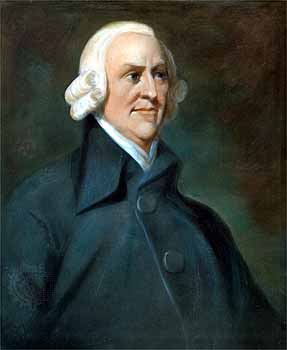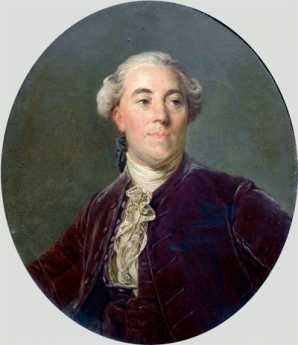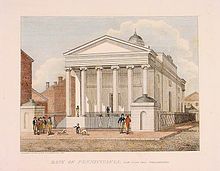Related Topics
Robert Morris: Think Big
Robert Morris wasn't born rich, or especially poor, but he was probably illegitimate. He had no recollection of his mother; his father, a tobacco trader in England, emigrated to Maryland and died rather young. It didn't take long for young Robert to become one of the richest men in America.
Unwritten Constitutional Modification
It is so difficult to amend the Constitution, we mostly don't do it. Our system is to have the Supreme Court migrate slowly through several small adjustments, watching the country respond. Occasionally we have imported new principles, sometimes not entirely wise ones, adopted without the same seasoning.
Private Sector Disciplines Congress

|
| Adam Smith |
Two centuries after our present narrative, when President William Clinton once proposed a financial adventure, Robert Rubin replied, "The bond market won't let you do it." In this way, the former Wall Street investment banker educated his politician boss that the most powerful wealth of any nation is hidden, locked up in homes, businesses, infrastructure, population education, and other long-term assets. Such wealth normally transforms into cash only when the Treasury borrows it (usually by selling government bonds) because by Constitutional intention the alternative of raising taxes is essentially confiscatory. By contrast, the use of bonds requires only an agreement on price. Bond use is thereby related to supply and demand, with the government generally selling bonds and the public generally buying them. The government sells as many bonds as it pleases, but the price received will immediately sink if too many bonds are for sale. Viewed another way, bond prices announce the market's daily assessment of probable government solvency because the isolated bond market is solely interested in the probability of being repaid.
 In modern wars, the longest purse must generally determine the event. 
|
| George Washington, May, 1780 |
In 1779 there was no bond market, so Robert Morris set about creating one. Acting then as only a private citizen, but faced with his government being run into the ground, Robert Morris proposed the creation of a "bank", the Bank of Pennsylvania, created, owned and managed by private citizens. The first bank in the nation didn't take retail deposits and was unlike banks we have today in other ways. Modeled more like a bond fund of the Twenty-first century, the Bank of Pennsylvania got its funds through fairly large subscriptions from wealthy people. Robert Morris himself was probably the heaviest subscriber. A bond market was thus created, with subscriptions flooding in when the public was pleased with its government, and flooding out when the public didn't like the looks of things. Naturally, there was a profit: the bonds the bank sold to subscribers were priced higher than the bonds the bank bought from the government. In this way, the public was assured the process of setting prices remained in neutral hands. The government could print bonds freely, but the Bank of Pennsylvania couldn't buy them unless somebody gave it some money, and that wouldn't happen unless prices rose to the "market clearing level," of agreement between potential buyers and sellers. The nature of the deal didn't change much when later banks got their funds from deposits, and one later enduring feature also didn't change: Governments hate banks because banks are in a position to frustrate governments intent on spending what they please.

|
| Jacques Necker |
Quite soon, the public could be visualized as composed of debtors and creditors; the two main political parties have mostly had a matching composition. Progressive politicians, like Albert Gallatin, Thomas Jefferson, Andrew Jackson, Robert LaFollette, William Jennings Bryan, Woodrow Wilson, and Barack Obama have demonized banks, often threatening to nationalize or eliminate what is basically a neutral bookkeeping function. Adam Smith had written The Wealth of Nations three years earlier; Morris gave copies to friends and had obviously read the book, as had Alexander Hamilton. Morris also entered into exciting correspondence with Jacques Necker, the Swiss/ French banking genius, but Necker soon died, leaving it uncertain how much influence he had on America. This group of people gave us a system in which the public markets set the price of a currency, not the other way around. In the 1779 case, galloping inflation quickly came under control and goods soon reappeared in the markets, although the continuing war exerted relentless pressure until 1783 for the government to do more borrowing.
|
||
In another irony, during the year he was totally out of office (conservatives were restored to power in the October 1780 election), Morris enjoyed his greatest personal prosperity and exerted almost total personal control of the currency; it was fruitless to accuse him of using government office for private gain when he held no office. During this brief interval, Morris also created the first American corporate conglomerate, the series of partnerships called Peter Whitesides and Company. At least as profitable were his personal relationships with the French Ambassador Luzerne and the emissary from Havana, Juan de Miralles, who introduced him to large pools of investment capital from abroad. His American businesses became almost too numerous to count, again highlighting his prodigious ability to work. Meanwhile, his social life was as active as anyone's, extending his hospitality and affability world-wide, and anticipating a return to public life. All of this took about a year.
During this period, his sole civic activity was the Bank of Pennsylvania. As a bank, it had a relatively short life. As a subtlety of government, it would be hard to find its equal in any other empowerment of the people. Many centuries of history had formerly taught the lesson that public office was the way to get seriously rich. Morris flaunted a brand new American banner: public corruption was a waste of time, like any other zero-sum game.
Originally published: Tuesday, June 21, 2011; most-recently modified: Monday, July 22, 2019
